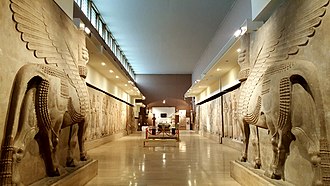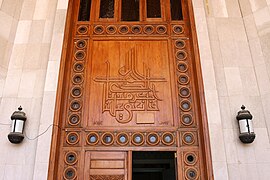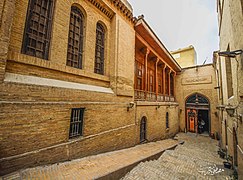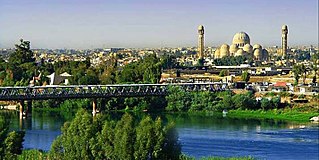
Nineveh Governorate is a governorate in northern Iraq. It has an area of 37,323 km2 (14,410 sq mi) and an estimated population of 2,453,000 people as of 2003. Its largest city and provincial capital is Mosul, which lies across the Tigris river from the ruins of ancient Nineveh. Before 1976, it was called Mosul Province and included the present-day Dohuk Governorate. The second largest city is Tal Afar, which had an almost exclusively Turkmen population.

Erbil Governorate, sometimes referred to by the alternative spelling Arbil Governorate, is a governorate of Iraq in Kurdistan Region. It is the capital and economic hub of the autonomous region of Kurdistan Region.

Sulaymaniyah, also called Slemani, is a city in the east of the Kurdistan Region of Iraq, not far from the Iran–Iraq border. It is surrounded by the Azmar, Goizha and Qaiwan Mountains in the northeast, Baranan Mountain in the south and the Tasluja Hills in the west. The city has a semi-arid climate with very hot dry summers and cold wet winters.

Kurdistan Region is an autonomous region in Iraq comprising the four Kurdish-majority governorates of Dohuk, Erbil, Halabja, and Sulaymaniyah and bordering Iran, Syria, and Turkey. The Kurdistan Region encompasses most of Iraqi Kurdistan but excludes the disputed territories of Northern Iraq, contested between the Kurdistan Regional Government and the central Iraqi government in Baghdad since 1992 when autonomy was realized. The Kurdistan Region Parliament is situated in Erbil, but the constitution of the Kurdistan Region declares the disputed city of Kirkuk to be the capital of the Kurdistan Region. When the Iraqi Army withdrew from most of the disputed areas in mid-2014 because of the ISIL offensive in Northern Iraq, Kurdish Peshmerga entered the areas and held control there until Iraq retook the areas in October 2017.

The Erbil Citadel, locally called Qelat is a tell or occupied mound, and the historical city centre of Erbil in the Kurdistan Region of Iraq. The citadel has been inscribed on the World Heritage List since 21 June 2014.

Erbil Sports Club is a sports club based in the city of Erbil, Kurdistan Region that plays in the Iraqi Premier League, the first-tier of Iraqi football. The club is also known as "Yaney Hewlêr", the Kurdish name for Erbil.

The 1991 Iraqi uprisings were ethnic and religious uprisings in Iraq led by Shi'ites and Kurds against Saddam Hussein. The uprisings lasted from March to April 1991 after a ceasefire following the end of the Gulf War. The mostly uncoordinated insurgency was fueled by the perception that Iraqi President Saddam Hussein had become vulnerable to regime change. This perception of weakness was largely the result of the outcome of the Iran–Iraq War and the Gulf War, both of which occurred within a single decade and devastated the population and economy of Iraq.

The Iraqi Kurdish Civil War was a civil war that took place between rival Kurdish factions in Iraqi Kurdistan during the mid-1990s, mostly between the Patriotic Union of Kurdistan and the Kurdistan Democratic Party. Over the course of the conflict, Kurdish factions from Iran and Turkey, as well as Iranian, Iraqi and Turkish forces, were drawn into the fighting, with additional involvement from American forces. Between 5,000 and 8,000 fighters and civilians were killed.

Erbil, also called Hawler and known in ancient history as Arbela, is the capital and most populated city in the Kurdistan Region of Iraq. There is no current census of the city and official population statistics are not available, its population is estimated to be around 1,200,000.
The 2005 Erbil bombing was a suicide attack on the offices of Kurdish political parties in Erbil, Kurdistan Region, on May 4, 2005. The attacker detonated explosives strapped to his body as people lined up outside a police recruiting center in Erbil. Ansar al-Sunna claimed responsibility. This attack is an example of religious terrorism, groups who commit terrorist acts because of religion believe that their deity or deities are on their side and that their violence is divinely inspired and approved. This attack is also an example of Strategic terrorism. Which is a form of terrorism where the terrorist plans to inflict mass casualties. The goals of Strategic terrorism are normally not local objectives but global objectives or regional objectives. Ansar al-Sunna's goal is to transform the country of Iraq into an Islamic state so their goals are regional.
Nasrin As'ad Ibrahim, better known by the nom de guerreUmm Sayyaf, is the widow of Abu Sayyaf. She was captured in May 2015 by US Delta Force soldiers on the mission where they killed her husband, a suspected leader of the Islamic State.

Tourism in Iraq refers to tourism in the Western Asian country Iraq. Iraq was one of the main destinations for many years, however it changed dramatically due to conflicts. The tourism in Iraq has faced many challenges, however, in recent years there has been improvements. The capital city Baghdad is the second largest city in the Arab world and the 4th largest in the Middle East. Iraq has several World Heritage Sites, dating back to ancient Mesopotamia, most notably Babylon Iraq. Iraq is considered to be a potential location for ecotourism. Erbil was chosen as "Arab Tourism Capital" in 2014 by the Arab Tourism Committee.

Kurdistan Region–Poland relations are bilateral relations between Kurdistan Region and Poland. Kurdistan Region is represented in Poland through a representation in Warsaw since 2004, while Poland has a consulate general in Erbil since 2012. In 2005, Polish Prime Minister Marek Belka, Foreign Minister Adam Rotfeld, Minister of National Defense Jerzy Szmajdziński and Minister of Culture Waldemar Dąbrowski met Kurdish President Masoud Barzani and Prime Minister Nechirvan Barzani in Erbil and stated their support for the reconstruction of Iraq, including Kurdistan Region.

Holy See–Kurdistan Region relations are bilateral relations between Holy See and Kurdistan Region. The Holy See has no representation in Kurdistan Region and the latter has no representation in the Holy See.
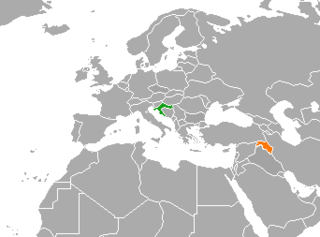
Croatia–Kurdistan Region relations are bilateral relations between Croatia and Kurdistan Region. Croatia has plans of opening a consulate in Erbil, while Kurdistan Region has no representation in Croatia. In August 2014, after a request by the United States, Croatian authorities sent an undisclosed amount of weapons to Kurdistan Region. The weapons were mostly of Yugoslav origin. Later, it was revealed that the military aid included 20,000 pieces of HS Produkt VHSs.

The Erbil Civilization Museum is an archeological museum which is located within the city of Hawler, the capital of Iraqi Kurdistan. It is the second largest museum in Iraqi Kurdistan, after the Sulaymaniyah Museum in Sulaymaniyah Governorate in terms of contents and collections. It houses artifacts which date back to the pre-historic period to the late Abbasid period.

Amna Suraka is a museum in Sulaymaniyah, Kurdistan Region of Iraq.

The following is a timeline of the history of the city of Erbil, Kurdistan Region.

The following is a timeline of the history of the city of Sulaymaniyah, Iraq.
